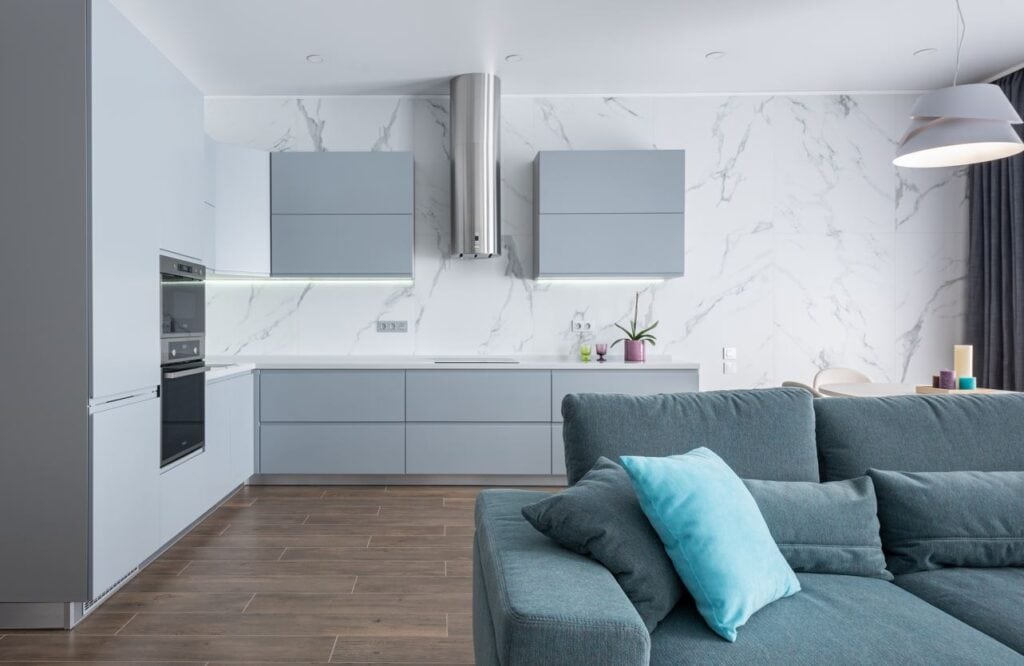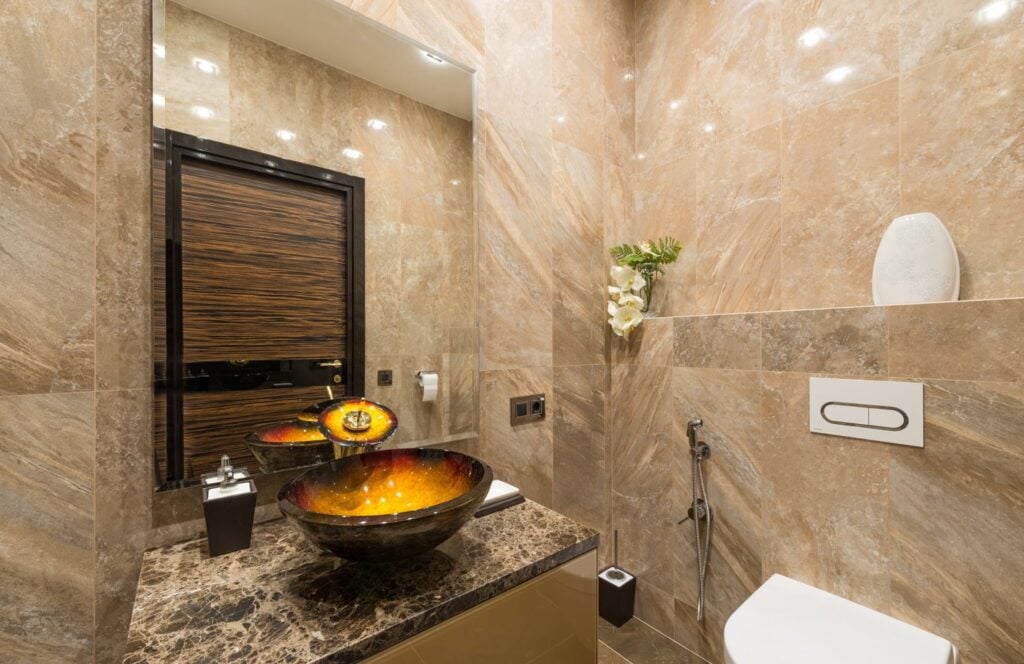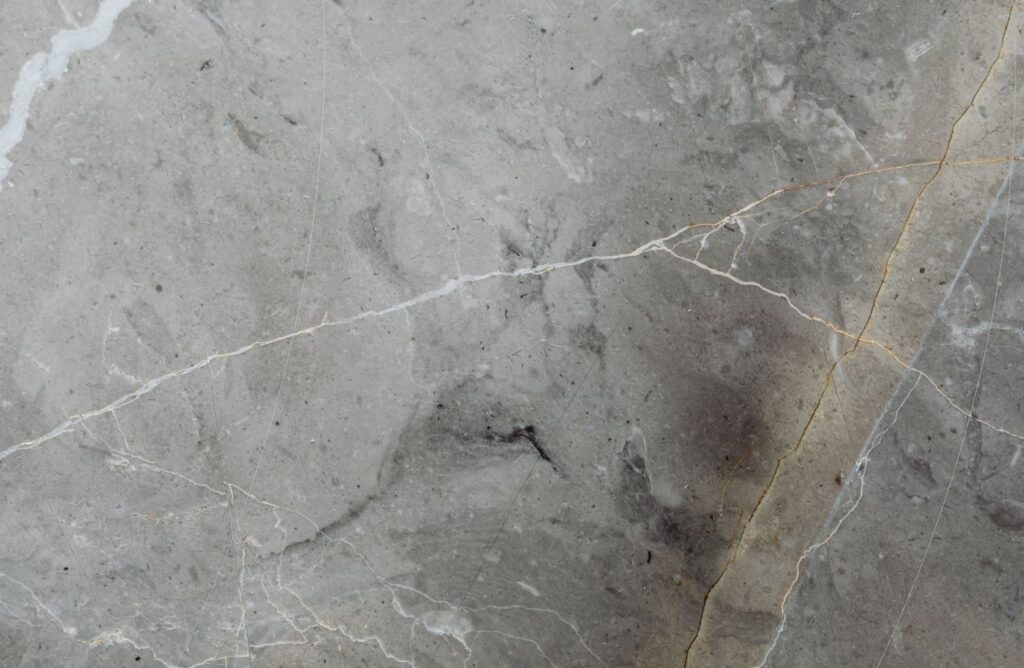Is there such a thing as the ideal flooring material? Is there one that has lasted the test of time and is durable, low-maintenance, aesthetically pleasing, one-of-a-kind, flexible, and increases the value of your home? Nothing is perfect. However, the line could be slightly fuzzy when talking about stone flooring. The more pertinent enquiry is, naturally, which option is ideal for you? Our stone flooring guide will tell you.
What Is Stone Flooring?
Stone flooring is constructed using rocks mined and refined from their natural state. Most stone floors are installed using tiles, similar to ceramic or porcelain. It existed before any buildings were ever built.
Kitchens, bathrooms, dining areas, and laundry rooms often feature stone floors. Those above are just a few possible applications. Stone flooring is a great choice for every room in the house due to its beauty and durability. Stone flooring is common in public areas and patios, so you have likely seen it before.
Why You Should Use Stone Tiles
Stone tiles are naturally beautiful, giving off an air of sophistication and elegance, but they also stand the test of time. It does not become out of date or go out of style, which is a bonus because it means you do not need to renovate your home every few years to stay up with the most recent trends.
Tiles made from natural stone, which are both beautiful and durable, are frequently used for flooring because of their ability to "open up" a room with their natural light and airiness.
Granite tiles, Limestone tiles, Marble tiles, and travertine tiles are just some of the natural stone floor materials available, giving you plenty of options to find the perfect fit for your home's decor.
Stone tiles can give a room a timeless, opulent appearance, while slate tiles give a more natural, earthy feel. Depending on your taste, you can have a modern look with highly polished limestone tiles or a rustic yet refined look with travertine floor tiles. You can find natural floor tiles that fit your aesthetic preferences.
Advantages of Using Natural Stone Tiles
Using tiles made from real stone throughout your home has many benefits, including the following:
Natural stone tiles are low maintenance.
A floor made of natural stone is long-lasting, beautiful, and simple to care for. They are simple to maintain and will be around for a while. It is ideal for floors in homes with children since it can resist daily use's constant wear and tear.
Property value is increased.
Since natural stone flooring is classic and does not change with the seasons, it will always increase the resale value of your home.
The Natural Charm
Natural stone tiles, without a doubt, have a stunning appearance. They have been around for quite some time, and for good reason: they make any building look more sophisticated.
Brings Cosiness
Natural stone tiles don't generate heat, but they can make a space feel cosier due to their earthy tones and smooth surfaces. Therefore, even in dark rooms, natural stone tiles help create a welcoming glow that makes a huge difference.
Unique Pieces
On a stone floor, all tiles are different. Stone tiles are a classic choice for flooring because of their unique colouring, veining, and natural qualities. You may rest assured that your home or business will always stand out.
Maintain a Cool House
Because of its ability to reflect the sun's heat, natural stone tiles are increasingly popular for use in homes in warmer climates or those that receive a great deal of direct sunshine during the warmer months.
Sanitary Flooring
Stone tiles are easy to maintain because they don't collect dirt, hair, or skin particles.
Good for Underfloor Heating
Because of their high thermal conductivity, natural floor tiles are an excellent choice for use with underfloor heating systems. Your new floor will not only look great, but it will serve a useful purpose as well.
Durable and Sturdy
Tiles made from natural stone last a long time and are quite robust. They won't break easily or get stained, so that's one less thing you have to worry about.
Easily Cleaned
Natural stone tiles can be easily cleaned with water and a cloth or mop without harsh chemicals, making them a great choice for families with young children.
FAQs About Masonry
Yes, stone flooring is hypoallergenic and doesn't trap allergens like carpet, contributing to better indoor air quality.
Stone flooring is an excellent conductor of heat and pairs well with underfloor heating, providing warmth and comfort in cold weather.
Stone flooring is considered eco-friendly as it is a natural, renewable resource that doesn't require harmful chemicals during production.
Yes, stone flooring can enhance your home's resale value as potential buyers often perceive it as a high-end and desirable feature.
Yes, there are various types of stone with unique textures and colours, allowing you to choose a style that complements your home's décor, whether classic, rustic, modern, or contemporary.
Considerations for a Stone Floor
There are certain things to think about before making such an expensive choice. A stone floor is built to last, so that's the first thing to remember. If you're the kind to swap out carpet flooring colours frequently, think carefully about whether or not you'll like your stone floor choice in the long run. The following are additional considerations to take into account.
Functional Requirements
Stone flooring is, quite literally, weighty. The floor joists may need to be strengthened in older houses because they are too small to carry the extra weight. Subfloors in all homes should be thick enough, and underlayment may sometimes be necessary. Before installing, you should know about any potential hidden expenses.
Slipperiness of a Surface
Excessively slippery stone wouldn't be a good choice for a bathroom floor, would it? The coefficient of friction, often known as traction or slipperiness, refers to this property. The greater the coefficient, the better the tile's traction.
Oxidation
Many different things go into making a slab of natural stone. Iron is one element that occasionally appears on the stone's surface as vivid reds and ambers. However, iron is susceptible to oxidation when exposed to air.
Usage
The wide variety of stone flooring options is one way they stand out from other materials. The benefits and drawbacks of each variety vary. Wet areas are suitable for the installation of any stone flooring. However, some of them are more suited to this task than others. Some materials resist wear and tear better. Still others have varying care needs based on their environment.
Consider the heavy foot traffic and other stresses your stone floor will be under. Find a material that satisfies both the required durability and the prefered aesthetic.
Maintenance
Most varieties of stone flooring will require periodic upkeep. All of them are susceptible to staining to some degree. Water seepage can be a problem for some. Sedimentary varieties are typically the most porous and require the most frequent sealer applications for protection.
Igneous and composite stones are less likely to need sealing; some even arrive pre-sealed from the manufacturer. Stone flooring should be cleaned with something other than strong chemicals. You can avoid unpleasant surprises by learning what kind of care your new floor will need.
Absorption Rating/Porosity
The higher the absorption rating, the more porous the material and the greater the risk of staining. Absorbent stones can break easily in freezing temperatures. Naturally occuring stones have variable absorption rates due to the wide range of formation processes and mineral compositions. When compared to granite, sandstone has a strong propensity for water resistance.
Four categories of natural stones are crucial to understand when talking about absorption rates:
Non-vitreous
The most complete soaking up possible. Non-vitreous tiles are not recommended for usage in moist areas.
Semi-vitreous
They are significantly less absorbent but have higher maintenance costs the more liquid they're subjected to.
Vitreous
The norm for taking in. This is the typical absorption level for floor tiles, and it is sufficient for most light to moderate foot activity areas indoors and out.
Impervious:
Extremely impermeable to fluids. Simplest to care for. Commonly seen in public places and businesses.
Finish
Several different coatings are available. The finish applied to a stone floor significantly affects how it looks, feels, is used, and is priced. The suitable floor finishes will depend on the material and how they will be used. Commonly used sheens include polish, hone, refine, brush, and natural. More expensive than their less shiny competitors, polished finishes command a premium.
Grade
Certain stores employ a quality grading system. Tile size, shape, thickness, and surface quality may affect its grade. The stone is typically divided into three categories based on grading systems:
Grade 3:
Major size, form, surface, or chipping defects are otherwise good materials. Useful as finishing touches or ornaments.
Grade 2:
Subtle flaws, such as scratches, chips, or uneven surfaces, are present in the material.
Grade 1:
The material is of a consistently good grade.
Warranty
Rarely do problems arise that necessitate replacement under warranty. Because they are so confident in the quality of their products, most manufacturers provide lengthy guarantees on materials. However, paying attention to installation companies' guarantees for their work is wise. Verify all the details. More valuable than a lengthy warranty with limited protections is one with comprehensive and detailed coverage.
Conclusion
Stone flooring is a type of flooring made from natural stones, which are mined and refined from their natural state. It is commonly used in kitchens, bathrooms, dining areas, and laundry rooms, and is a great choice for every room in the house due to its beauty and durability. Stone tiles are known for their natural beauty, elegance, and durability, making them a timeless choice for homes.
There are various natural stone floor materials available, such as granite, limestone, marble, and travertine tiles, which can give a room a timeless, opulent appearance or a more natural, earthy feel. Natural stone tiles offer several advantages, including being low maintenance, increasing property value, having a natural charm, bringing cosiness, and being unique due to their unique coloring, veining, and natural qualities. They are also suitable for homes in warmer climates, as they reflect the sun's heat, and are easy to maintain.
Natural stone tiles are also good for underfloor heating due to their high thermal conductivity, making them an excellent choice for underfloor heating systems. They are durable and sturdy, making them easy to clean, making them a great choice for families with young children.
Before purchasing a stone floor, consider its functional requirements, slipperiness, and oxidation properties. Stone flooring is weighty and may require strengthening in older homes. It's important to consider the floor joists, thickness of subfloors, and underlayment. The coefficient of friction, or slipperiness, is crucial for the tile's traction. Natural stone is susceptible to oxidation when exposed to air.
There are various stone flooring options, with some being more suitable for wet areas and others having varying care needs. Stone flooring requires periodic maintenance, with sedimentary varieties being the most porous and requiring frequent sealer applications. Igneous and composite stones are less likely to need sealing and may even arrive pre-sealed.
Absorption ratings and porosity are important factors to consider. Natural stones have variable absorption rates, with non-vitreous tiles being the most complete soaking up possible. Absorbent stones can break easily in freezing temperatures, while sandstone has a strong propensity for water resistance.
Finishing a stone floor can affect its appearance, feel, and pricing. Common sheens include polish, hone, refine, brush, and natural. Stones are typically categorized into three grades: Grade 3, which has major size, form, surface, or chipping defects, Grade 2, which has subtle flaws, and Grade 1, which is consistently good grade.
Warranties are often provided by manufacturers, but it's crucial to verify the details of installation companies' guarantees for comprehensive coverage.
Content Summary:
- Is there such a thing as the ideal flooring material?
- However, the line could be slightly fuzzy when talking about stone flooring.
- The more pertinent enquiry is, naturally, which option is ideal for you?
- Our stone flooring guide will tell you.
- Stone flooring is a great choice for every room in the house due to its beauty and durability.
- Tiles made from natural stone, which are both beautiful and durable, are frequently used for flooring because of their ability to "open up" a room with their natural light and airiness.
- Granite tiles, Limestone tiles, Marble tiles, and travertine tiles are just some of the natural stone floor materials available, giving you plenty of options to find the perfect fit for your home's decor.
- Depending on your taste, you can have a modern look with highly polished limestone tiles or a rustic yet refined look with travertine floor tiles.
- You can find natural floor tiles that fit your aesthetic preferences.
- It is ideal for floors in homes with children since it can resist daily use's constant wear and tear.
- Property value is increased.
- Since natural stone flooring is classic and does not change with the seasons, it will always increase the resale value of your home.
- Natural stone tiles, without a doubt, have a stunning appearance.
- On a stone floor, all tiles are different.
- Stone tiles are a classic choice for flooring because of their unique colouring, veining, and natural qualities.
- You may rest assured that your home or business will always stand out.
- Because of its ability to reflect the sun's heat, natural stone tiles are increasingly popular for use in homes in warmer climates or those that receive a great deal of direct sunshine during the warmer months.
- Because of their high thermal conductivity, natural floor tiles are an excellent choice for use with underfloor heating systems.
- Your new floor will not only look great, but it will serve a useful purpose as well.
- Tiles made from natural stone last a long time and are quite robust.
- There are certain things to think about before making such an expensive choice.
- A stone floor is built to last, so that's the first thing to remember.
- If you're the kind to swap out carpet flooring colours frequently, think carefully about whether or not you'll like your stone floor choice in the long run.
- Before installing, you should know about any potential hidden expenses.
- Excessively slippery stone wouldn't be a good choice for a bathroom floor, would it?
- The coefficient of friction, often known as traction or slipperiness, refers to this property.
- The greater the coefficient, the better the tile's traction.
- The wide variety of stone flooring options is one way they stand out from other materials.
- The benefits and drawbacks of each variety vary.
- Wet areas are suitable for the installation of any stone flooring.
- Consider the heavy foot traffic and other stresses your stone floor will be under.
- Find a material that satisfies both the required durability and the prefered aesthetic.
- Most varieties of stone flooring will require periodic upkeep.
- Stone flooring should be cleaned with something other than strong chemicals.
- You can avoid unpleasant surprises by learning what kind of care your new floor will need.
- The higher the absorption rating, the more porous the material and the greater the risk of staining.
- This is the typical absorption level for floor tiles, and it is sufficient for most light to moderate foot activity areas indoors and out.
- Simplest to care for.
- Several different coatings are available.
- The finish applied to a stone floor significantly affects how it looks, feels, is used, and is priced.
- The suitable floor finishes will depend on the material and how they will be used.
- Certain stores employ a quality grading system.
- Tile size, shape, thickness, and surface quality may affect its grade.
- The stone is typically divided into three categories based on grading systems: Grade 3: Major size, form, surface, or chipping defects are otherwise good materials.
- Useful as finishing touches or ornaments.
- Grade 2: Subtle flaws, such as scratches, chips, or uneven surfaces, are present in the material.
- Grade 1: The material is of a consistently good grade.
- Rarely do problems arise that necessitate replacement under warranty.
- Because they are so confident in the quality of their products, most manufacturers provide lengthy guarantees on materials.
- However, paying attention to installation companies' guarantees for their work is wise.
- More valuable than a lengthy warranty with limited protections is one with comprehensive and detailed coverage.


